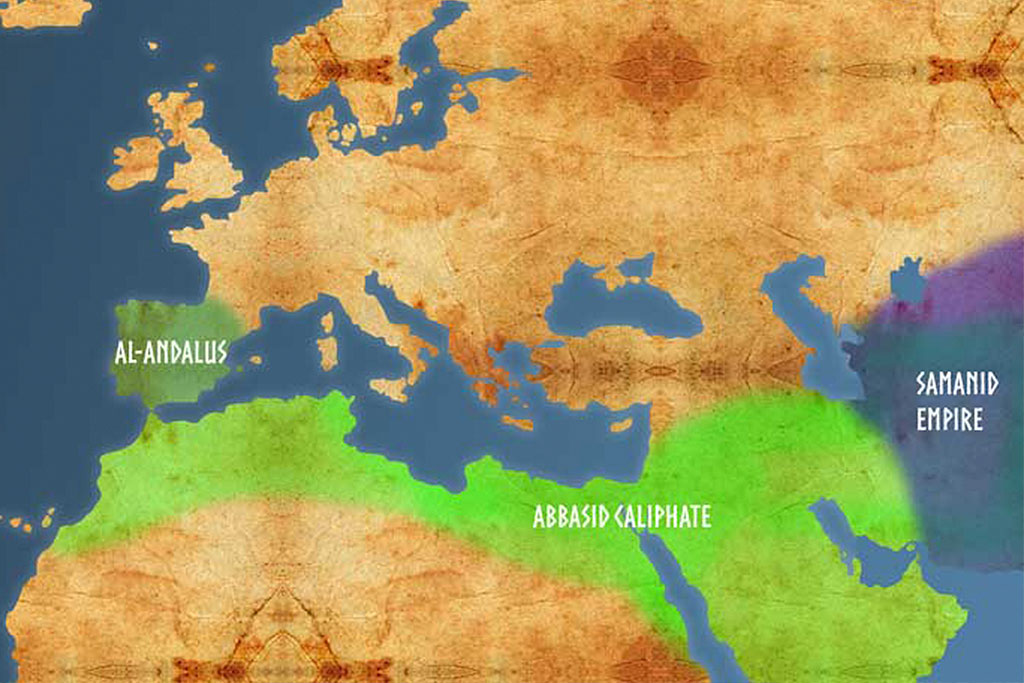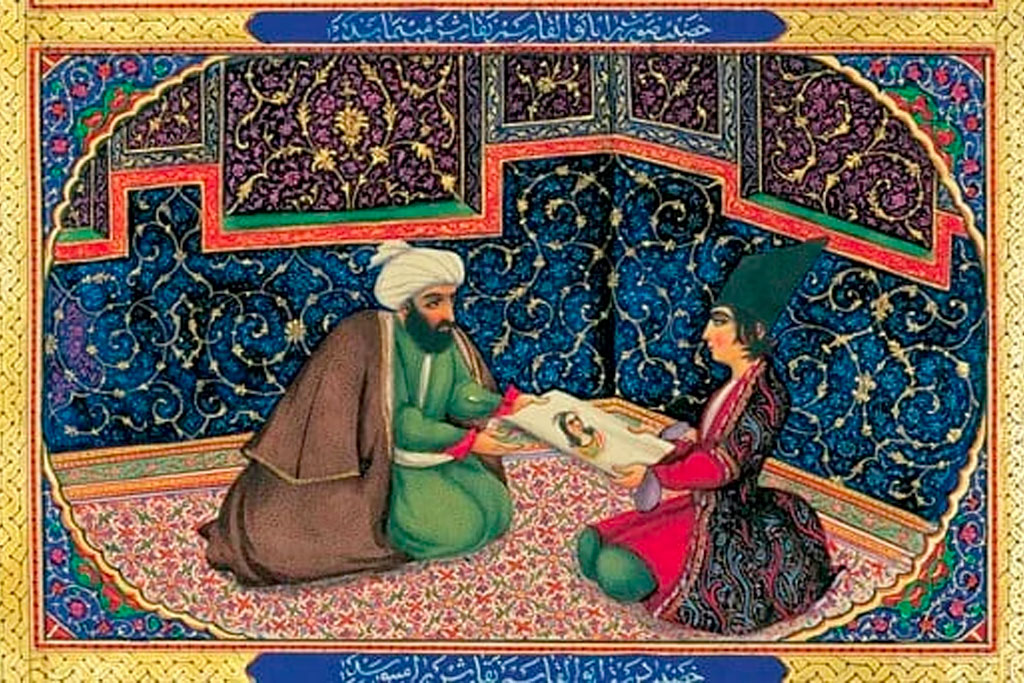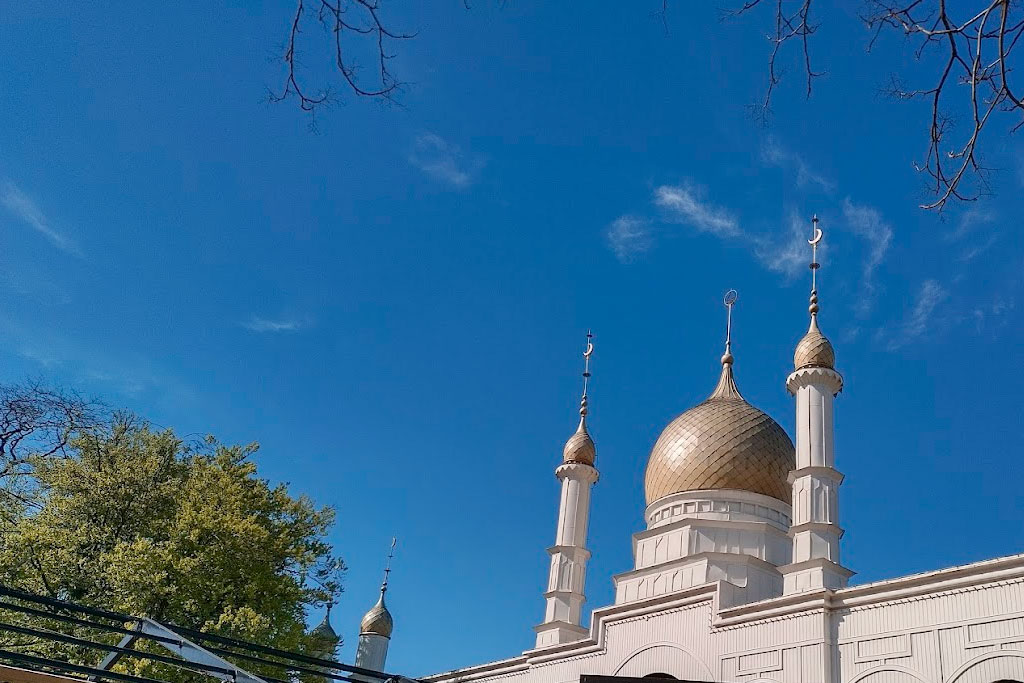When you look at the present state of affairs it’s hard to imagine religious customs and practice in early mediaeval times.
All the different pagan traditions were pretty laissez-faire about everything, so easy to walk in and out that door as you’d see fit; Christianity was new and exotic, came with a huge package of rules and suppression, but also as a great equaliser for the poor and the slaves; and Islam was the new kid in the block with a lot of fresh modernization.
Believe it or not, but compared to mediaeval Christianity Islam was laid back, gave room for powerful women and the pursuit of scientific exploration. There was only one period of fasting, where Christianity had several, and for some reason people seemed more healthy in the Muslim world. Who could have known washing your hands five times a day was good for you, when the Christian priests would tell you it would lead to pneumonia?
More importantly the different Muslim empires were a beacon of religious tolerance. In Al-Andalus (present day Spain and Portugal) Christians, pagans and Jews were welcome to live and practise their religion as they saw fit. As none of them practised zakat (the Muslim rule of giving to the poor) they would be forced to do so indirectly, by paying an additional tax, but many religious groups thrived under the Moors.
That is the Islam the Vikings met during their trading and raiding expeditions to Iberia, Morocco, Tunisia, and the lands around the Byzantine empire; most notably Cairo, Baghdad and Babylon.
Now you might imagine this chilled religion would align much better with the even more chilled Vikings, and wonder why they didn’t choose Islam.
The most obvious answer is of course proximity, as Scandinavia was surrounded by the Christian Anglo-Saxons and the Holy Roman Empire (present day Germany, in fact). With the Orthodox Christians as their most important trade partners in Miklagarðr, the choice was easy. But it’s also worth noticing that at first it was an extremely watered down edition of Christianity that was presented to the Vikings.
The Muslim world they called Serkland, which literally means dress-land, no doubt reflecting the fashion in the Muslim world, though the people in the Byzantine empire mostly followed the same fashion. Perhaps they have also been included in the label Serkland. That’s hard to guess now.

So, you might ask, when did the Muslim golden age end, and when did Islam stop being a beacon of tolerance?
And the answer is unfortunately it correlates with the crusades.
From the 1090s European warlords and armies flocked to Palestine to conquer land around the holy city of Jerusalem. The reward was the usual loot from everything you could steal from conquered enemies, but this time even with the blessing of the church. If you survived you could return as a very wealthy saint.
As Spain was conquered (or liberated) by the Christians, in 1492, hard measures were inforced on all non-christians, and even the people who converted to Christianity, not to be killed or driven out, were later subjected to genocide.
Muslims, pagans and many Jews fled to Morocco, where they could live in peace and harmony for a few hundred years.
Meanwhile European scholars spend most of their time translating Arabic texts on medicine, mathematics, astronomy, navigation, metallurgy, etc., as the Muslim world was literally hundreds of years ahead of Europe in these fields.
Vikings never participated in any of the crusades in the Middle East and the Iberian peninsula, but they did actually invent the crusades, in northern Europe, by attacking pagan groups, as soon as they, themselves, had become Christians.
For the very same reasons as everybody else; Viking raids in a new wrapping.
They may even have served as an inspiration for the mayhem in the Middle East that followed a few hundred years later.
At first the Palestine crusades went very well for the Christians, but as time went by they ran out of luck, and defeat followed defeat, until the point where it became apparent that this could never be a successful venture.
Worst of all, though, was that Islam had now put on another face, and would never again be the same fun-loving open-minded beacon of tolerance.
As gender equality and diversity has gained acceptance in most of the Christian world, over the last couple of hundred years, Islam has in many ways chosen a different path.
In the historic Viking Age Miklagarðr (Constantinople, present day Istanbul) was the Great City, that in practice was the capital of all of the Black Sea and Mediterranean area, with flourishing trade and an impenetrable city wall. As it was conquered by the Ottoman empire the decline started. Today Istanbul is a big city, but not the centre of the universe anymore; not even the capital of Turkey.
The Ottomans obviously dissolved the Varangian Guard (the Byzantine empire guard made up of Viking mercenaries), and at the same time Kievan Rus (the mighty Viking empire in present day Ukraine, Russia and Belarus) was falling apart under Mongolian occupation.
The Vikings turned their attention to domestic affairs back in Scandinavia, and completely forgot about Serkland and the Muslims.
Out of sight, out of mind.

Several hundreds of years later the Islamic world came into fashion again.
In the years between the two world wars there was a renewed interest for Turkey, Egypt and the Middle East, and without first hand knowledge about the actual culture there, Scandinavians began to romanticise the Muslim world, as a place of decadence: High quality tobacco, belly dancing, shisha, non stop drinking and promiscuous sexual behaviour. You couldn’t sell cigarettes if they were not labelled as “Turkish” or “Egyptian” tobacco (like Camel), and a nightclub in Scandinavia had to be built in the shape of a Mosque or Arabian Palace (look at Nimb in Tivoli amusement park, Copenhagen, or Moriska Paviljongen in Folkets Park, Malmö).

As Turkish and Middle Eastern immigrants started to arrive in Scandinavia in the 1970s it was a profound shock.
Even the always diplomatic queen of Denmark said that this integration process is not going to be as easy as we had expected: “People are not going to adopt the Danish culture simply by living here.”
Sadly the necessary efforts to deal with this have not been given the attention it deserves, and this has created a very visible division between cultures in Scandinavia, borderlining racism (from both sides of the fence).
Viking is not an ethnicity or a religion, but a cultural identity, and a thousand years ago a large number of immigrants and locally conquered people became a part of this identity (also read Open Arms, The wrong Roots and The (not so) Pale Tribe).
Ten centuries ago we invented the crusades and half a century ago we failed to set up a framework to integrate the immigrants.
It’s easy to say it’s too late now, to right the wrongs, but in another half of a century we can blame the present for not giving it a try.
Open-minded curiosity and religious tolerance was the recipe for our ancestors, who were world champions of blending in, in foreign lands, and assimilating the upward 25% of immigrants per generation in Scandinavia. It’s time to revive that cultural character.
At the height of being invested in this undertaking the Danish political establishment has introduced a law that in effect means that everybody (read: Muslim women) are forced to shake hands with the mayor, when being granted Danish citizenship.
A handshake.
A language course.
A new rule that says an immigrant can’t invite a spouse without being able to support both of them financially.
At the same time the political debate is loaded with ethnic scepticism and cultural conservatism.
It’s rather impressive, if you ask me, how the political leadership manages to be racist and super inefficient in the integration endeavour, at the same time.
How about “Welcome, Muhammad, we are looking forward to being inspired and informed by your interesting religion and culture, that you are encouraged to practise to your heart’s delight, as long as you remember rational legislation always holds higher priority, and that you must be willing to accept religious caricatures.
We eat pork and drink alcohol; you are in no way obligated to participate, and you are not allowed to complain about it.”
This balance seems to be aligned with the way integration has been successful for centuries in the Scandinavian past. English Aldith moving to Scandinavia would become Astrið, just like Valdemar moving to Kiev would become Vladimir.
